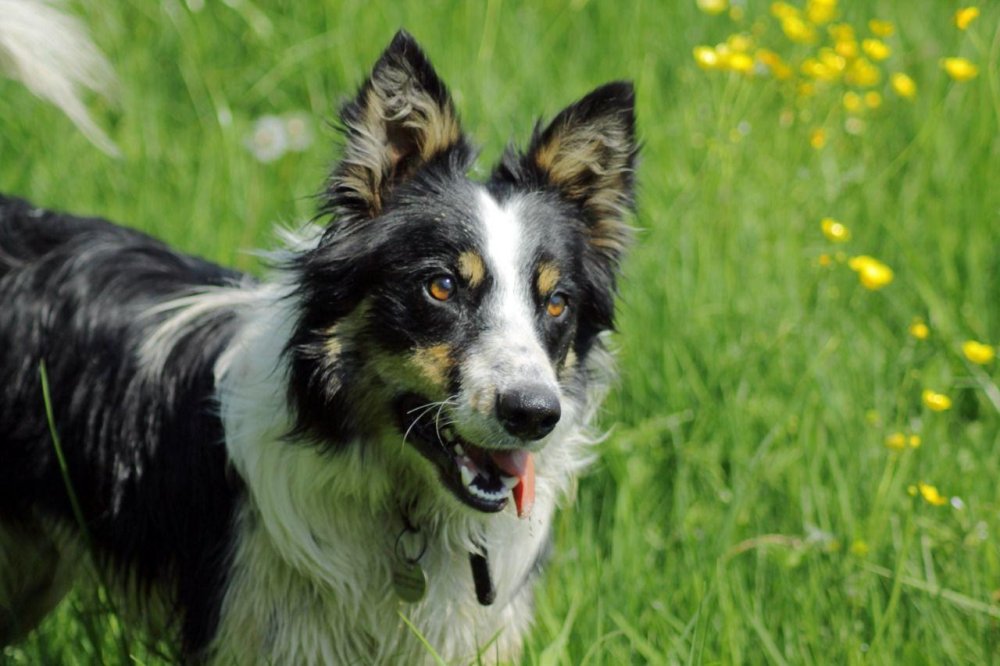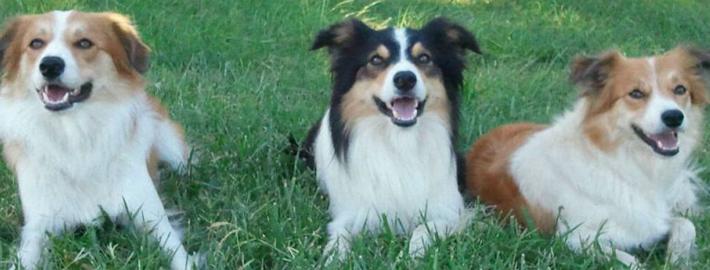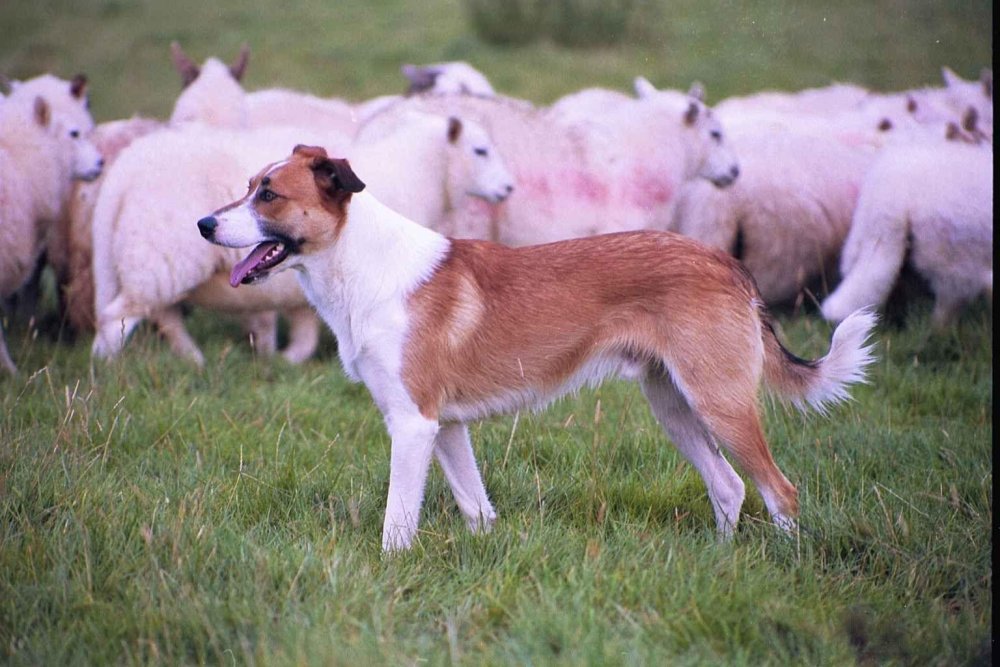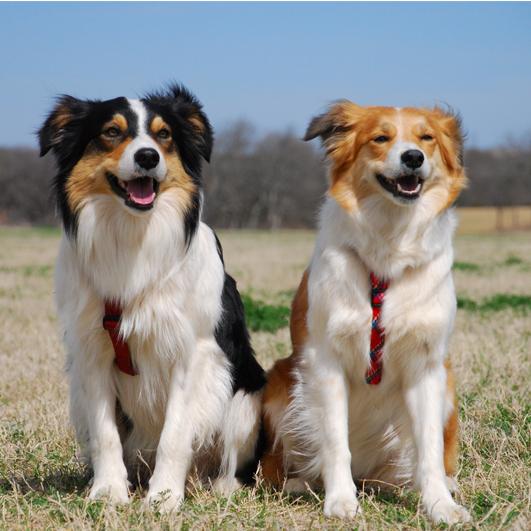- Breed Category: Herding
- Country of Origin: Wales
- Average Height: 46-56 cm (18-22 inches)
- Average Weight: 16-25 kg (35-55 pounds)
- Average Life Span: 12-15 years
- Grooming Requirements: Moderate, regular brushing needed
- Exercise Requirements: High, needs daily exercise
- Coat Type: Medium, dense double coat
- Coat Color Variations: Black, white, red, merle
- Shedding Level: Moderate to high
- Ear Type: Semi-erect or fully erect
- Tail Type: Long, bushy tail
- Temperament: Intelligent, energetic, loyal
- Intelligence Level: Very high
- Barking Tendency: Moderate
- Compatibility with Children: Good, with proper socialisation
- Compatibility with Other Pets: Generally good with other dogs
- Training Ease: Easy, eager to learn
- Common Health Issues: Hip dysplasia, eye conditions
- Dietary Needs: High-quality, balanced diet
- Energy Level: Very high
- Drooling Tendency: Low
- Sensitivity to Weather: Tolerates cold, sensitive to heat
- Overall Maintenance Level: Moderate
- Original Purpose: Herding livestock
- Apartment Friendly: Not ideal, needs space to run
- Best Suited For: Active families, rural settings
- Cost of Ownership: Moderate to high
- Unique Traits: Versatile herding abilities
The Welsh Sheepdog is a breed that embodies agility, intelligence, and a strong work ethic. Known for their versatility, these dogs have been a staple in Welsh farming communities for centuries. They are not just herders but also loyal companions.
“The Welsh Sheepdog is a true working dog, bred for its ability to think independently and adapt to various tasks.”
– Dr. John Smith, Canine Historian
This article aims to delve into the breed’s unique characteristics, rich history, and essential care tips. Originating in the rugged landscapes of Wales, these dogs have evolved alongside shepherds, developing skills that make them invaluable in managing livestock.
Early Development and Role in Welsh Farming

Early Development of the Breed
The Welsh Sheepdog’s roots trace back to the early days of Welsh farming, where they were bred for their intelligence and adaptability. These dogs were developed to handle the challenging terrain of Wales, making them perfect for herding sheep across hills and valleys. Over time, selective breeding honed their natural instincts, creating a dog that could think on its feet and respond to the unpredictable nature of farm life.
Role in Welsh Farming and Herding
In Welsh farming, the sheepdog is more than just a helper; it’s an essential part of the team. Their ability to manage large flocks with minimal guidance is legendary. Farmers relied on these dogs to move sheep efficiently, ensuring the livestock’s safety and the farm’s productivity. Their role extended beyond herding, as they often acted as guardians, protecting the flock from predators.
Key Historical Figures and Events
Throughout history, several key figures have contributed to the breed’s development. Notably, shepherds and farmers who recognised the dog’s potential played a crucial role. Events like the establishment of sheepdog trials in the 19th century helped standardise and showcase their skills, further cementing their reputation as exceptional working dogs.
Physical Characteristics
Physically, Welsh Sheepdogs are medium-sized with a strong, athletic build. Their coats can vary in colour, often featuring a mix of black, white, and tan. Their keen eyes and alert ears are a testament to their intelligence and readiness to work. These dogs are built for endurance, with a muscular frame that allows them to work tirelessly throughout the day.
Appearance and Unique Traits
Welsh Sheepdogs are medium-sized, with a robust and athletic build that speaks to their working heritage. Their coats are typically a striking mix of black, white, and tan, though variations exist. These colours often form distinctive markings, making each dog unique. Their eyes are sharp and expressive, while their ears stand alert, always ready for action.
What sets them apart physically is their incredible agility and endurance. These dogs are built to handle the rugged Welsh terrain, and their muscular frame allows them to work tirelessly. Whether it’s herding sheep across vast fields or navigating tricky landscapes, their physical prowess is unmatched.
Temperament and Behaviour
When it comes to temperament, Welsh Sheepdogs are known for their intelligence and independence. They’re quick thinkers, often making decisions on the fly, which is crucial for herding. Despite their independent streak, they’re incredibly loyal and form strong bonds with their handlers. Their behaviour is generally calm and focused, but they have a playful side that shines through when they’re off duty.
Personality and Love for Family

Personality Traits
Welsh Sheepdogs are renowned for their intelligence and loyalty. These dogs are not just smart; they’re quick learners, always eager to pick up new skills. Their loyalty is unmatched, making them steadfast companions who thrive on being part of a family.
Role as a Working Dog
As working dogs, Welsh Sheepdogs are in a league of their own. Their ability to think independently and adapt to various tasks makes them invaluable on farms. They’re not just herders; they’re partners who can manage livestock with minimal supervision, making them indispensable in farming environments.
Interaction with Children and Other Animals
Welsh Sheepdogs are known for their gentle nature, making them excellent family pets.. They’re great lovers of play, often forming strong bonds with children. Their natural herding instincts mean they’re usually good with other animals, though early socialisation is key to ensuring harmony.
Training Needs
Training a Welsh is a rewardinga rewarding experience. They thrive on mental stimulation and physical activity, making them ideal for families who who. Their intelligence means they pick up commands quickly, but they do require consistent training to keep them engaged and well-behaved.
Training and Care for Welsh Sheepdogs

Importance of Early Training and Socialisation
Getting a Welsh Sheepdog off to a good start with early training and socialisation is crucial. These dogs are naturally intelligent and independent, so introducing them to various environments, people, and other animals early on helps them develop into well-rounded adults. It’s all about setting the foundation for a confident and adaptable dog.
Recommended Training Techniques
When it comes to training, positive reinforcement is the way to go. These dogs respond well to praise and treats, making them eager learners. Consistency is key, so regular training sessions that challenge their minds will keep them engaged. Incorporating games and tasks that mimic herding can also be beneficial.
Daily Exercise Requirements and Activities They Enjoy
Welsh Sheepdogs are active and need plenty of daily exercise. They love activities that challenge both their bodies and minds. Think long walks, agility courses, or even a game of fetch. Keeping them busy not only satisfies their physical needs but also prevents boredom, which can lead to unwanted behaviours.
Health and Lifespan
Generally, Welsh Sheepdogs are healthy dogs with a lifespan of around 12 to 15 years. Regular vet check-ups, a balanced diet, and plenty of exercise contribute to their longevity. Like any breed, they can be prone to certain genetic conditions, so it’s wise to be aware of any health issues common in their lineage.
Health and Care for Welsh Sheepdogs

Common Health Issues
Welsh Sheepdogs are generally robust, but like any breed, they can face certain health issues. Hip dysplasia and eye conditions are among the more common concerns. Regular vet visits can help catch these early, ensuring your dog stays in top shape.
Average Lifespan and Health Tips
With proper care, these dogs can live between 12 to 15 years. A balanced diet, regular exercise, and mental stimulation are key to a long, healthy life. Keeping them active not only supports their physical health but also keeps their sharp minds engaged.
Preventative Care Recommendations
Preventative care is crucial. Regular vaccinations, flea and tick prevention, and dental care should be part of their routine. Early detection of potential issues can make a significant difference, so don’t skip those annual check-ups.
Grooming and Maintenance
Grooming a Welsh Sheepdog is relatively straightforward. Their coats need regular brushing to prevent matting and to keep them looking their best. Bathing should be occasional, as over-washing can strip their coat of natural oils. Regular nail trims and ear checks are also important to maintain their overall health.
Coat Care and Grooming Routines

Shedding and Seasonal Grooming Tips
Welsh Sheepdogs have a double coat that requires regular attention, especially during shedding seasons. Brushing them a few times a week helps manage loose hair and keeps their coat healthy. During spring and autumn, when shedding is more intense, daily brushing can make a big difference. It not only reduces the amount of hair around your home but also helps prevent matting.
Bathing should be done occasionally, as over-washing can strip their coat of essential oils. A good rule of thumb is to bathe them when they start to smell or get particularly dirty. Regular ear checks and nail trims are also part of their grooming routine, ensuring they stay comfortable and healthy.
Diet and Nutrition
A balanced diet is crucial for the health and vitality of a Welsh Sheepdog. High-quality dog food that meets their nutritional needs is essential. Look for options rich in protein to support their active lifestyle. Fresh water should always be available, and treats should be given in moderation to prevent weight gain.
Consulting with a vet can help tailor a diet plan that suits your dog’s specific needs, considering factors like age, weight, and activity level. Regularly monitoring their weight and adjusting their food intake accordingly will help maintain their health and energy levels.
Nutritional Needs and Feeding Tips

Nutritional Needs for Optimal Health
Welsh Sheepdogs thrive on a diet that supports their active lifestyle. High-quality dog food rich in protein is essential to maintain their energy levels and muscle health. Look for foods that include whole meats and avoid those with excessive fillers or artificial additives.
Foods to Include and Avoid
Include lean meats, fish, and vegetables in their diet for a balanced nutritional profile. Avoid foods high in fat and sugar, as these can lead to weight gain and health issues. Always ensure fresh water is available.
Feeding Schedules and Portion Recommendations
Feeding twice a day is generally recommended for Welsh Sheepdogs. Portion sizes should be adjusted based on their age, weight, and activity level. Consulting with a vet can provide specific guidance tailored to your dog’s needs.
Fun Facts and Trivia
Did you know that Welsh Sheepdogs are known for their unique ability to understand complex commands? This intelligence makes them not only excellent herders but also quick learners in training sessions. Their keen sense of smell and hearing also make them great at detecting changes in their environment, a trait that has been invaluable in their herding duties.
Interesting Tidbits and Famous Welsh Sheepdogs

Interesting Tidbits about the Breed
Welsh Sheepdogs are not just known for their herding skills; they have a fascinating history. Unlike many other herding breeds, they are not recognised by major kennel clubs, which has allowed them to maintain a diverse gene pool. This diversity contributes to their robust health and adaptability. They are also known for their unique ability to work silently, using eye contact and body language to communicate with livestock, a skill that sets them apart from other herding breeds.
Famous Welsh Sheepdogs in Media or History
While not as widely recognised as some other breeds, Welsh Sheepdogs have made their mark in history and media. One notable figure is “Gelert,” a legendary dog from Welsh folklore. Although the story is more myth than fact, it highlights the deep bond between Welsh people and their dogs. In more recent times, Welsh Sheepdogs have appeared in documentaries showcasing their incredible herding abilities, bringing attention to their skills and versatility.
Final Thoughts

The Welsh Sheepdog is a remarkable blend of intelligence and loyalty. These dogs are not only skilled herders but also devoted companions. Their rich history and unique traits make them invaluable to both farmers and families. Embracing a Welsh Sheepdog means committing to an active lifestyle and a rewarding partnership. Consider welcoming this versatile breed into your life and experience the joy of a true working dog.
